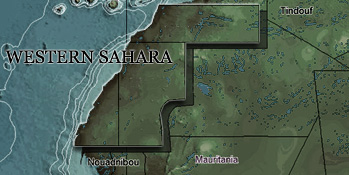Norway Decision "Disappoints" Kosmos, Cairn
US firm Kosmos Energy and UK-based Cairn Energy have expressed “disappointment” at being excluded by Norway’s central bank from the country’s $825bn Oil Fund over Western Sahara. The bank’s decision, announced June 28, follows an assessment four months ago by Norway’s Council on Ethics. The Oil Fund, among the world's largest sovereign wealth funds, is already understood to have divested its equity stakes in the companies.
Kosmos insisted: “We fundamentally disagree with the Council’s assessment of our activities offshore Western Sahara, where we have spent considerable time on the ground working with local people to understand their views of oil and gas exploration. The Council’s decision fails to recognise that people in Western Sahara – whom we have met in hundreds of face-to-face conversations – want the economic opportunities that come from increased foreign investment. In our experience, this desire cuts across demographics and political affiliations.”

Western Sahara (Map credit: Western Sahara Resource Watch)
Kosmos added that the Norwegian decision came “after several years of engagement between Kosmos and the Council [and] it was our understanding that the Council would continue to observe our activities and maintain an open dialogue.” It continued: “The Council’s assertion that our activities represent a ‘serious violation of fundamental ethical norms’ is totally at odds with our activities there and remains unexplained even after we requested clarification.”
Cairn too said it was “disappointed” by the central bank's divestment of its stake in Cairn, as it had “participated in one exploration well offshore Western Sahara two years ago (Cairn 20%, Kosmos Energy 55% operator) which was unsuccessful, and it has no current operations in the region.”
Cairn insisted it had “always acted in accordance with international law which states that responsible exploration offshore Western Sahara, a UN designated non-self-governing territory, can occur in parallel with the UN-led discussion on the region's future.”
But Cairn’s case is undermined by its website which, even on June 28, was still listing the exploration permit Cap Boujdour under its “Morocco” review and omitting to say that it is offshore Western Sahara. The site added that: “Negotiations are ongoing with [Moroccan] Office National des Hydrocarbures et des Mines (ONHYM) for a continued presence in the offshore Boujdour maritime area.” In contrast, Kosmos's website does state that the Cap Boujdour permit which it operates is offshore Western Sahara and stresses that, as an explorer, it is not involved in 'removal of resources.'
Cairn insisted it has “a strong commitment to corporate social responsibility and local community consultation across our global operations, and as signatory to the UN Global Compact, its priority is to maintain transparency around all our activities and to comply with all international laws.”
However, the Norwegian move come three months after the Polisario front, recognised by the UN as the representative of Western Sahara’s inhabitants – some of whom for decades have been refugees in Algerian camps – submitted the coordinates of what they consider their 200-mile Exclusive Economic Zone to UN Secretary-General Ban Ki-moon.
In a March 5 statement, Polisario said it was “not willing to tolerate illegal exploitation of its natural resources, including rich offshore fisheries resources, nor ongoing efforts by Morocco and complicit foreign companies to explore the seabed resources in Western Sahara’s waters” and noted that Total and other big European pension funds had said they will no longer support oil and gas exploration.
Separately, campaign group Western Sahara Resource Watch (WSRW) on June 28 called on Polish state-owned PGNIG and its subsidiary Geofyzika Krakow to abandon a licence for seismic studies offshore Western Sahara. Earlier this year Norway’s Oil Fund divested from UK-listed San Leon Energy over its stake in the Tarfaya Onshore block in northwestern Western Sahara.
Ban Ki-moon fell foul of the Moroccan government in late March after using the word 'occupation' to describe Morocco's annexation of Western Sahara since 1979 during a visit to refugees from the territory in southern Algeria. Despite Ban saying later he regretted his use of the word, Rabat ordered the UN to pull out several staff and close a military liaison office for the UN 'Minurso' peacekeeping mission to Western Sahara.
Mark Smedley | www.naturalgasafrica.com | www.naturalgaseurope.com


